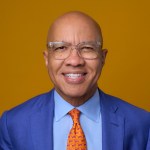Darren Walker delivers remarks at the opening of the Global Village at the 21st International AIDS Conference.
July 17, 2016, Durban, South Africa
Remarks as prepared.
Good afternoon, everyone. I am so thrilled and honored to be here at the opening of the Global Village! Thank you to the government of South Africa and the people of Durban for your warm welcome. And thank you to the International AIDS Conference for bringing us together.
This is a very special gathering. We have so many leaders here who deeply understand the challenges we face. You are working on the ground, directly with the communities that are affected most by this terrible disease. And you are all on the frontlines of social change.
I am particularly glad to see so many young leaders. You are the future of this work, and your courage, and energy, and optimism inspire us all. I hope this is the first of many gatherings—because only in coming together can we build the partnerships that will have the greatest impact on addressing HIV and AIDS.
That’s because these gatherings not only connect us to one another, they also help us connect ideas we often keep in separate silos. It’s easy to think about this disease as separate from our other social problems—or as an epidemic separate from injustice. But we know these issues are related. And as a result, our approach must be integrated.
At the Ford Foundation, we are committed to addressing inequality in all its forms, and we know that inequality continues to drive the HIV/AIDS epidemic. Indeed, those who experience inequality are at the highest risk to contract the virus. Whether it’s young women and girls—who cannot protect themselves from the virus without protecting themselves from domestic and sexual violence. Or the LGBT community—who experience continued economic and social exclusion—and the violation of our human rights.
We need to advocate for the voiceless and the vulnerable, and we must rewrite the cultural narratives that create and perpetuate stigma and discrimination. To fight this disease, we must fight inequality. And to eliminate inequality, we must eliminate HIV/AIDS.
For our part, we are committed to working closely with organizations that fight the inequality that fuels this virus. Together we must continue thinking beyond medical treatment, and think of how we can improve how people are treated—and mistreated—in our society.
We have seen so many victories over the years. And just as it’s been said, “it takes a village to raise a child”—it will take this global village—of creative, smart, and strong activists—to eradicate HIV and AIDS.
Looking around today, I’m confident that we are closer to that day now more than ever.
Thank you.
